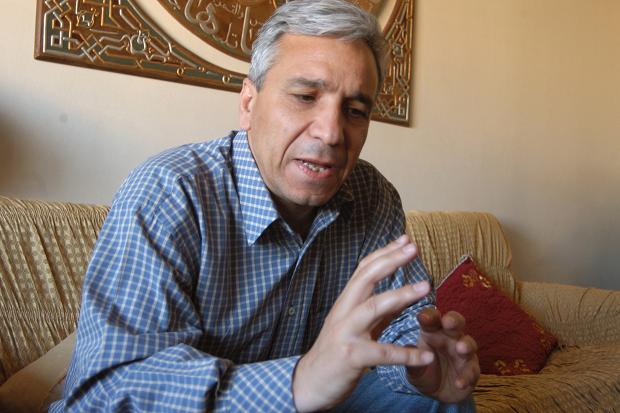Yassin al-Haj Saleh is a celebrated Syrian writer and political dissident who spent sixteen years and fourteen days in jail at the behest of Hafez al-Assad’s regime for being a member of the Communist Party. He, like Tony Abbott, believes there needs to be a ‘religious reformation in Islam’; however, his progressivism couldn’t be more different than Abbott’s reactionary divisiveness.
While al-Haj Saleh argues that ‘[m]any Muslims, many Islamists, are essentialist’, Abbott has displayed a penchant for invoking the views of Egyptian coup leader President Abdel Fattah el-Sisi, a man who as head of the army ordered the systematic murder of unarmed political protestors in Rabaa Square in August 2013. (Human Rights Watch has described the killings as probable crimes against humanity.)
Indeed, Abbott’s position has much more in common with the ultra-conservative elements within Islam he claims to be denouncing. As al-Haj Saleh explains in ‘Armed Words’, an interview recently published in The New Inquiry:
…many critics of Islam are essentialist in their own way. Even though some of them are thinking about Islam on the basis of modernity or secularism, there is nothing radical about their critiques—they are not interested in human dignity, equality, freedom, or justice.
For Abbott, Islam (and, by extension, Muslims) is something that needs to be tamed, so that order and stability can be restored.
His abiding belief that what’s also needed is a ‘restoration of cultural self-confidence in those who are supporters of Western civilisation’ is further evidence that ‘clash of civilisations’ commentary almost always emanates from the West as it casts its gaze East. The commentariat never talks about imperialism as a ‘clash of civilisations’, despite the fact that it caused (and continues to cause) incalculable destruction and suffering.
For Abbott, the West is civilised (and civilises), while those in the East are marauding barbarians. His lack of historical perspective and his Western bias are staggering, yet this is hardly surprising for those who observed his prime ministership. He has shown little regard for those who suggest that the West’s meddling in the Middle East has played a role in the creation of the Islamic State.
Similarly, beyond pontificating that ‘all cultures are not created equal’, he offers little in the way of reasons as to why, as he says, ‘Islam has never had…a Reformation, an Enlightenment [and] a well-developed concept of the separation of church and state’.
Al-Haj Saleh, by contrast, understands the complexities involved in his calls for a ‘religious reformation in Islam’, saying in the New Inquiry interview:
Now Islam, in our modern experiences, has been in many instances a tool of resistance against colonialism, against Western hegemony, and this prevented many of us from fighting against the problems within Islam, things related to the inequalities between men and women, for instances, between Muslims and non-Muslims, and things related to legitimizing absolute power and tyranny.
He understands culture—or what Jürgen Habermas conceptualised as the public sphere—to be a field for strategic struggle, in which ideas carry weight and have the potential to enact change:
…we have three monsters in Syria, three inhuman creatures. One, the Islamic monster, second, the monster of Tyranny. And third, the Western Imperialist monster. And culture can be our weapon to remake these monsters into human energies, human politics, human actors. Culture is a humanizing field to transform these monsters to human-scale powers.
This is a universalist conception of culture, not the divisive one propagated by Abbott.
Moreover, among al-Haj Saleh’s preconditions for a ‘religious reformation in Islam’, Abbott—who supported the Iraq war and has called for Australian ‘boots on the ground’ in Syria—is part of ‘the Western Imperialist monster’ that needs to be denounced. In other words, the challenges in reforming Islam are part of the same struggle against the kind of resurgent fascism that has become acceptable in the Western mainstream.
Abbott’s us-versus-them approach fits neatly within hundreds of years of Western cultural dominance. It’s given us endless wars and cost countless lives, and it’s always the Other that’s left to pick up the pieces when it goes horribly wrong.
Al-Haj Saleh suggests that maybe these wars and deaths can be somehow harnessed to achieve a greater good:
And to do this [make the world a better place], cultural revolution, suffering, the experience of those who have been killed, crushed, suffered, are an important basis for this. And you can challenge the religious authorities, the powers, in the name of this suffering. This is the real basis for a new humanity, and hopefully a new thinking, a new culture.
Al-Haj Saleh and many other progressive Muslims continue to struggle against the fanaticism within the Islamic tradition. They understand that change always needs to happen from the bottom up if it’s to be long-lasting. Abbott and his cohort, on the hand, offer a kind of faux-humanitarian authoritarianism as the answer, which will ultimately lead only to more death, destruction and suffering.
The challenge for progressives in the West is to continue to rail against the likes of Abbott, who use the wars in the Middle East as an excuse to inflame fear, incite hatred and promote further war. To speak out is a gesture of solidarity with those suffering under the Islamic State and the Assad regime, and it is also part of the broader project to create what al-Haj Saleh calls ‘a new humanist culture’.
(This was originally published in Arena Magazine, No.140, 02 2016–3 2016.)

